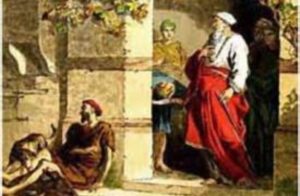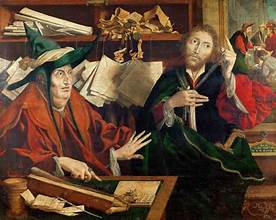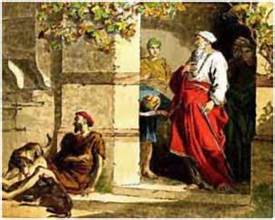Luke 16:1-31 King James Bible KJV

The Parable of the Unjust Steward and the Story of The Rich Man and Lazarus
Luke Chapter 16:1-31 King James Bible KJV. Luke Chapter 16 contains two key teachings of Jesus that address themes of wealth, stewardship, justice, and eternal consequences. It includes the Parable of the Unjust Steward and the story of the Rich Man and Lazarus, which explore the proper use of wealth and the consequences of failing to live righteously. Luke 16 teaches that how we handle our resources and relationships matters deeply to God and has both present and eternal significance. It calls for wise stewardship, justice, and a heart oriented toward God’s kingdom.
- Stewardship of Wealth: Jesus teaches that wealth is a resource to be used wisely, not to be hoarded or misused for selfish purposes. True stewardship involves using money to serve others and God’s kingdom.
- Eternal Perspective: The chapter contrasts short-term, worldly thinking with long-term, eternal consequences. The wise person lives with eternity in view, understanding that how they handle wealth and relationships now impacts their eternal destiny.
- Justice and Compassion: The story of the rich man and Lazarus teaches that God is deeply concerned with justice for the poor and marginalized. Failing to show compassion to those in need can lead to severe consequences in the afterlife.
- Faithfulness: Jesus emphasizes the importance of being faithful in small things, as it reflects the character necessary for larger responsibilities, both in this life and the life to come.
- Choosing Between God and Money: Jesus stresses that people must choose between serving God or serving wealth (v. 13). Wealth can be a helpful servant, but it can also become a destructive master if it takes the place of God.
Luke 16:1-31 King James Bible KJV
—————-

The Parable of the Unjust Steward – verses 1–13
This parable describes a steward (manager) who is about to be dismissed by his master for wasting his master’s possessions. Realizing that he is about to lose his job, the steward devises a plan. He reduces the debts of his master’s debtors, hoping that by doing so, he will secure favor with them once he is dismissed. Surprisingly, the master commends the steward for acting shrewdly, even though he was dishonest, because he acted wisely for his future. This parable teaches us:
- Wise Use of Resources: The steward’s actions are not praised for their dishonesty but for his foresight and prudent planning. Jesus uses this example to teach that followers of God should be wise in how they use their resources, particularly wealth, to secure eternal benefits.
- Spiritual Application: Jesus contrasts worldly wisdom with spiritual wisdom, encouraging His followers to use worldly wealth to help others and invest in eternal relationships that will “welcome them into eternal dwellings” (v. 9). It is about using material resources in ways that align with God’s kingdom.
- Faithfulness in Small Things: Jesus also teaches that how we manage small matters (like wealth) is a test of how we will handle greater spiritual responsibilities (v. 10). If someone is dishonest with little, they will be dishonest with much.
- Money as a Servant, Not a Master: The closing verse of the parable (v. 13) emphasizes that a person cannot serve both God and money. Money should not become a master but should be used as a tool to serve God.


The Story of the Rich Man and Lazarus – verses 19–31
This is a vivid story about a rich man who lives in luxury, indifferent to the suffering of a poor beggar named Lazarus, who sits at his gate, starving and covered in sores. After both men die, Lazarus is carried by angels to Abraham’s side (a place of comfort in the afterlife), while the rich man is tormented in Hades. From his place of torment, the rich man begs Abraham to send Lazarus to cool his tongue with water, but Abraham explains that a great chasm exists between them that cannot be crossed. The rich man then pleads for Lazarus to be sent to warn his brothers about their fate, but Abraham says they already have the teachings of Moses and the Prophets to warn them. This story teaches us:
- Eternal Consequences of Our Actions: This story emphasizes that the choices we make in this life, especially how we treat others, have eternal consequences. The rich man’s neglect of Lazarus in life leads to his eternal suffering.
- Reversal of Fortunes: There is a dramatic reversal in the afterlife—the poor and suffering Lazarus is comforted, while the rich man who lived in luxury without compassion faces torment. This illustrates God’s concern for justice and the poor.
- No Second Chances After Death: The story underscores that after death, there is no opportunity for repentance or changing one’s fate. This makes the present life the time to live righteously and heed God’s warnings.
- The Sufficiency of God’s Word: Abraham’s refusal to send Lazarus to warn the rich man’s brothers highlights that people have already been given sufficient revelation through the Scriptures to live righteously. Those who ignore God’s Word won’t be persuaded even by someone returning from the dead.
Luke 16:1-31 King James Bible KJV
1 And he said also unto his disciples, There was a certain rich man, which had a steward; and the same was accused unto him that he had wasted his goods.
2 And he called him, and said unto him, How is it that I hear this of thee? give an account of thy stewardship; for thou mayest be no longer steward.
3 Then the steward said within himself, What shall I do? for my lord taketh away from me the stewardship: I cannot dig; to beg I am ashamed.
4 I am resolved what to do, that, when I am put out of the stewardship, they may receive me into their houses.
5 So he called every one of his lord’s debtors unto him, and said unto the first, How much owest thou unto my lord?
6 And he said, An hundred measures of oil. And he said unto him, Take thy bill, and sit down quickly, and write fifty.
7 Then said he to another, And how much owest thou? And he said, An hundred measures of wheat. And he said unto him, Take thy bill, and write fourscore.
8 And the lord commended the unjust steward, because he had done wisely: for the children of this world are in their generation wiser than the children of light.
9 And I say unto you, Make to yourselves friends of the mammon of unrighteousness; that, when ye fail, they may receive you into everlasting habitations.
10 He that is faithful in that which is least is faithful also in much: and he that is unjust in the least is unjust also in much.
11 If therefore ye have not been faithful in the unrighteous mammon, who will commit to your trust the true riches?
12 And if ye have not been faithful in that which is another man’s, who shall give you that which is your own?
13 No servant can serve two masters: for either he will hate the one, and love the other; or else he will hold to the one, and despise the other. Ye cannot serve God and mammon.
14 And the Pharisees also, who were covetous, heard all these things: and they derided him.
15 And he said unto them, Ye are they which justify yourselves before men; but God knoweth your hearts: for that which is highly esteemed among men is abomination in the sight of God.
16 The law and the prophets were until John: since that time the kingdom of God is preached, and every man presseth into it.
17 And it is easier for heaven and earth to pass, than one tittle of the law to fail.
18 Whosoever putteth away his wife, and marrieth another, committeth adultery: and whosoever marrieth her that is put away from her husband committeth adultery.

19 There was a certain rich man, which was clothed in purple and fine linen, and fared sumptuously every day:
20 And there was a certain beggar named Lazarus, which was laid at his gate, full of sores,
21 And desiring to be fed with the crumbs which fell from the rich man’s table: moreover the dogs came and licked his sores.
22 And it came to pass, that the beggar died, and was carried by the angels into Abraham’s bosom: the rich man also died, and was buried;
23 And in hell he lift up his eyes, being in torments, and seeth Abraham afar off, and Lazarus in his bosom.
24 And he cried and said, Father Abraham, have mercy on me, and send Lazarus, that he may dip the tip of his finger in water, and cool my tongue; for I am tormented in this flame.
25 But Abraham said, Son, remember that thou in thy lifetime receivedst thy good things, and likewise Lazarus evil things: but now he is comforted, and thou art tormented.
26 And beside all this, between us and you there is a great gulf fixed: so that they which would pass from hence to you cannot; neither can they pass to us, that would come from thence.
27 Then he said, I pray thee therefore, father, that thou wouldest send him to my father’s house:
28 For I have five brethren; that he may testify unto them, lest they also come into this place of torment.
29 Abraham saith unto him, They have Moses and the prophets; let them hear them.
30 And he said, Nay, father Abraham: but if one went unto them from the dead, they will repent.
31 And he said unto him, If they hear not Moses and the prophets, neither will they be persuaded, though one rose from the dead.
You must be logged in to post a comment.